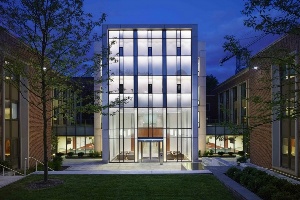Jul 31 2014
Two University of Pennsylvania building projects have received LEED Gold certification by the U.S. Green Building Council: The Krishna P. Singh Center for Nanotechnology and the Wharton School’s Steinberg-Dietrich Hall West Tower Entrance addition.
 Exterior view of Wharton School’s Steinberg-Dietrich Hall West Tower Entrance addition. Photo by Jeffrey Totaro
Exterior view of Wharton School’s Steinberg-Dietrich Hall West Tower Entrance addition. Photo by Jeffrey Totaro
They join Penn’s other LEED-certified projects; the Horticulture Center at the Morris Arboretum, which achieved a LEED Platinum rating, the highest possible, and existing LEED Gold projects including the School of Arts & Sciences’ Music Building, the Weiss Pavilion at Franklin Field, the commercial interior renovation creating Joe’s Café in Wharton School’s Steinberg-Dietrich Hall, the Wharton School’s San Francisco campus and the Law School’s Golkin Hall.
Both projects align with Penn’s Climate Action Plan, outlining strategies to reduce the University’s carbon footprint. The LEED, or Leadership in Energy and Environmental Design, Green Building Rating System is the internationally accepted benchmark for the design, construction and operation of high performance green buildings. It was developed by the U.S. Green Building Council.
The Krishna P. Singh Center for Nanotechnology, which opened in October 2013, was designed and built to meet LEED Gold requirements, using high-efficiency mechanical, electrical and plumbing equipment for public spaces in the building so that it operates at 14 percent above industry standard levels. Plumbing fixtures and systems reduce water use to 30 percent below industry standards. More than 90 percent of the site materials were diverted from landfill. Other LEED features include the use of natural light in ways that obviate lighting fixtures during daylight hours and using low-emitting interior finish materials. The building, designed by architects Marion Weiss and Michael Manfredi, also has two green roofs, one of which includes a sun deck and benches. Both use native vegetation that encourages biodiversity through the creation of local habitats. In addition, a wide front lawn on Walnut Street conceals a cistern below grade to capture and store rainwater that falls on the site for irrigation.
The Wharton School Steinberg-Dietrich Hall West Tower Entrance addition opened in early 2013. Designed by Kling Stubbins, it was built to achieve LEED Silver and exceeded that in its use of green features that, like the Singh Center, have green roofs that manage storm water runoff and reduce cooling loads and heat island effects, that utilize high-performance building materials and that have high-efficiency mechanical, lighting and ventilation systems. The 15,000-square-foot addition includes two high-occupancy classrooms and creates a new main entrance with a plaza offering seating areas and light colored pavers to reduce the heat island effect. Steinberg-Dietrich Hall also houses Joe’s Café, an eatery that was Penn’s first sustainable commercial interior, having earned LEED Gold in 2011.
Building “green,” is one of five basic strategies outlined in Penn’s Climate Action Plan, created in 2009 as a road map to guide the University’s sustainability efforts. The others are energy conservation, emissions reduction, waste minimization and academics, making environmental sustainability a part of the curriculum and educational experience for all Penn students.
Source: http://www.upenn.edu/